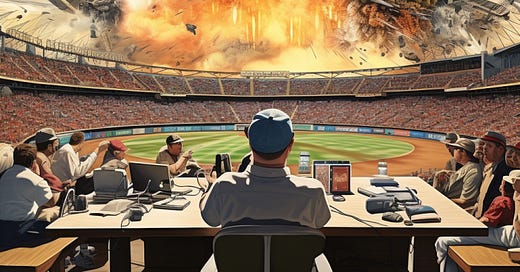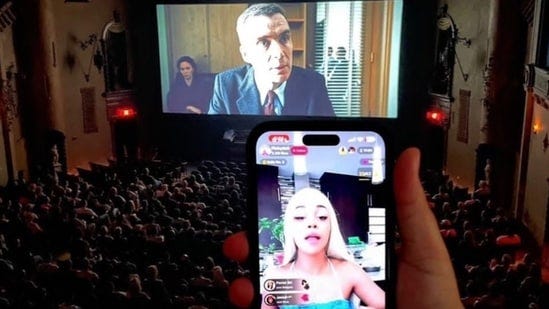I was at a NYC Twitter meetup on Tuesday, and I had a few talks with writer friends who felt stuck. After some diagnostic questions, I finally asked, “how long do you spend on an essay before you publish it?” The average answer was 2-3 hours. “What if you spent 6 hours? Or 15?” Rewrite it. Edit it. Read it out loud with a thick New York accent and decide what to cut. I do believe in the magic of the moment, but tedious editing helps weave together all that magic into something digestible by strangers.1
I have the opposite problem. I’m almost embarrassed to admit I spent 50 hours on “Burn Down the Stage.” 2 I diagrammed it in Miro, tortured it with GPT, and retyped it from scratch 5 times. Troubled by “this-is-the-one syndrome,” I even devised an intricate (but aborted) “promotion plan” that involved tricking Elon Musk to boost it.3 I didn’t publish anything else in July because of obsessive perfectionism (someone asked me what I did for work, and I swear I just said, “American Idol.”)
So should you write fast or slow? Do both.4 A fast and easy publishing cadence gives you permission to go slow and deep on other ideas without feeling guilty. The slow work improves the quality of your fast work too.
Basically, I need to start a newsletter.5
“What if you just picked 3 logs from your week, wrote an intro, and wove them together?” This issue is dedicated to
.I felt the hype for Oppenheimer. I heard rumors that it was “devastating.” Given the rise of nuclear paranoia in the last year, I thought this could be a culturally significant film, a modern Frankenstein that would warn our generation on what happens when you sever invention & implementation.6 Did it work?
July 22nd, 2023 5:18 pm (ET) —
Oppenheimer was a great story, with great cinematography, with a few historically good scenes [Trinity test, the speech, Truman’s office, etc.] in an overall mess of a movie. I don’t think Chris Nolan knows what he’s good at. I’m curious to learn more about his process. He’s unquestionably brilliant in some dimensions, but then utterly convoluted and frustrating in others. What is his editing process? Does he get feedback?
Parts of it were transcendent; the peak of what cinema could possibly be. These shining moments lasted ~90 seconds, but they were hidden between long stretches of “who’s that?” and “what did he say?” It’s like Nolan has an incredible voice, but completely missed the shiny dime7 and refused editing. 50% of the movie is a cerebral investigation, and I left emotionally unaffected.8
Leaving the theater, I saw crowds dressed in pink. “Barbenheimer” feels like a cultural resurgence of 1990s mass-media, where everyone gets excited over the same Idols. After not going to the theaters for years, some of us went on back-to-back days last weekend.
The clash between old media (movies) and new media (TikTok) can be felt in this single (stolen) meme by Elon. It’s as if short-form vertical-video destroyed our attention span. A 3 hour movie might feel impossible if you’ve been on TikTok.
The fact that Elon posted an image of PinkyDoll feels like “NPC streaming” went mainstream. Maybe you’ve seen these weird TikTok videos but can’t make sense of them. I decided to dive in. I installed TikTok on my phone and “live-wrote” whatever emerged through the Live feed. After 6 hours last week, I’m burnt out, but oriented. I get it. Here’s a deleted paragraph from “Burn Down the Stage” that will turn into it’s own essay.
July 28th, 2023 2:13 pm (ET) —
“Now in 2023, the weirdest incarnation of the stage has emerged through TikTok Live. There’s a new genre called, “NPC streaming,” where the Idol performs memorized, robotic, (sexual) gestures that correspond to virtual gifts that flash across the screen. The Lurkers can buy things from ice cream cone emojis to AR cowboy hats, ranging from 1 cent to $500, each gift animating the virtual Goddess in a different way. This puts the audience in control. A few thousand people “play” the streamer like an instrument. Like in American Idol, the crowd creates the show, except there’s no longer a 24-hour voting lag; now, the Idol is a digital rag doll, and your clicks can literally move its body. The idol is possessed by a faceless other that is hypnotizing itself, making up to $7,000 per stream.”
I’ve seen weird things, including a man slapping himself in the face 250 times to pay for his wedding.9 It’s hard to believe this is being rolled out to a billion people.10 The blitz pace of a TikTok feed probably does something to our culture’s sense of patience. Compare this new form of media to baseball; the boring sport, the country’s past-time. In 1946, 13% of the country went to a baseball game, and now, 20% of the country is on TikTok. I went to a game two weekends ago, the day after NPC streaming emerged.
July 14th, 2023 6:20 pm (ET) —
The beer hustlers, the chanting teenagers, the yellow vested security guards. The rumble of trains and stampedes. A sizable portion of the New York population collectively agrees to shuffle over to CitiField despite the lousy season and grim shot at the playoffs. This is a means of mass leisure, physical leisure. It’s inter-generational fun; the divine relief of spectating, to turn off and have no consequence, to blur out on left-field IPAs and convince yourself you’re connecting with the past times of your childhood and country. Baseball is the last battalion of patience in 2023.
Some people question if baseball will survive into the 2030s.11 I think the pace is refreshing. Really focusing on a game is almost meditative. This sport was the anchor of my childhood, and I want to write an essay that reveals the hidden wonder and mythology behind what seems boring and confusing on the surface.12
Some essays I liked last week by
, , andLet’s riff:
What did you think of Oppenheimer?
Have you been on TikTok Live?
What is your least favorite thing about baseball?
See you next week.
Footnotes:
You can improve through consistency. The idea behind Beeple’s Mosaic is that if you just show up every day, for years, you eventually get way better. There’s some truth to it. But when you don’t vary your routine, you eventually run into plateaus. I’m curious to know what else Beeple did besides his Everyday series to get better.
An essay I published last Friday about how social media was infected by the rise of American Idol.
“Every major platform we have, without exception, is structured like a talent show: the owners create a digital stage (a vacuum for fame) where a mass of lurkers vote to determine the fate of disposable idols. Instead of using the profound invention of the Internet to connect, stay in touch, and express ourselves, we’ve designed ourselves a tyrannical stage.”
It was an intentional move to photoshop Zuck onto Paula Abdul.
Time permitting. If you can only do one thing, write fast (write a newsletter). Aim to write a few slow things per year without pressure. Longer essays should organically emerge out of faster writing cadences. Forcing big ideas is exactly how you get stuck.
This post was written under a new constraint: I have 90 minutes to write and publish. In reality, it took 2-3 hours, but I can get it tighter. I don’t have to write from scratch. I already have a consistent logging practice, it’s just not distributed. In June, I logged 16,955 words over 234 logs (8 logs a day). You wouldn’t know unless you manually went over to my logs tab.
Idealistic musing: This film, at this time in history, through the power of Christopher Nolan, had an opportunity to send a shockwave through history. The story contained a message that’s super relevant to our current dilemmas (nuclear, AI, etc.). It seems like a lot of human tragedy comes from making the same mistakes over and over. Media can play a role in resurfacing forgotten lessons at the right time.
“Shiny dime” is writer slang for the point, the essence, the thesis, the main idea.
My expectations were set extremely high by Threads, a 1984 film by the BBC. They worked with Carl Sagan and other experts to show an accurate depiction of a nuclear apocalypse. There’s no soundtrack, and it makes “Day After Tomorrow look like a Disney Film.” I had to watch it in 3 sittings. I can’t say I recommend it unless you want to be devastated in a way you’ve never thought possible.
This whole phenomena clicked with me after I saw an NPC-copycat streamer who was so good at doing the robot that I thought my Verizon signal was cutting out. The robot… This is a modern version of street performance. Crowds stroll through, and creators have to stop them to get a tip. Except now it’s endless, global, and interactive. It’s the circus-as-a-platform.
I don’t want to be outright dismissive of TikTok. I want to be empathetic/open towards the creators who are winning (and losing) the game, and write about this phenomenon in a nuanced and personal way. But at a first glance, it seems anchored in hypnosis, spectacle, and self-humiliation. It even gets at a “torture itch” (ie: a modern dunk tank, but with slightly more mental illness LARPing).
Attendance and viewership for baseball has been tanking in the last decade. The recent rule changes (ie: the pitch clock) make the game faster and more exciting. There’s been a 9% uptick in 2023.
Both Terence McKenna & John Vervaeke speak about the role of throwing in human evolution. Throwing small projectiles involves aiming into the future; it helped us hunt and it developed our pre-frontal lobes. In that sense, baseball is a sport that honors the act that brought civilization into being.









Wow, this is so good! You’re telling me I can get one of these every week? Count me in! (And thanks for the mention, Michael.)
Also, I voted for the virtual busking essay because I know your descriptions of it will capture its absurdity. But I’m super interested in baseball as “the last battalion of patience.” My vote is both.
Stunning. Baseball as the antidote to TikTok. Never knew about the virtual busking phenomenon. Mind boggling.